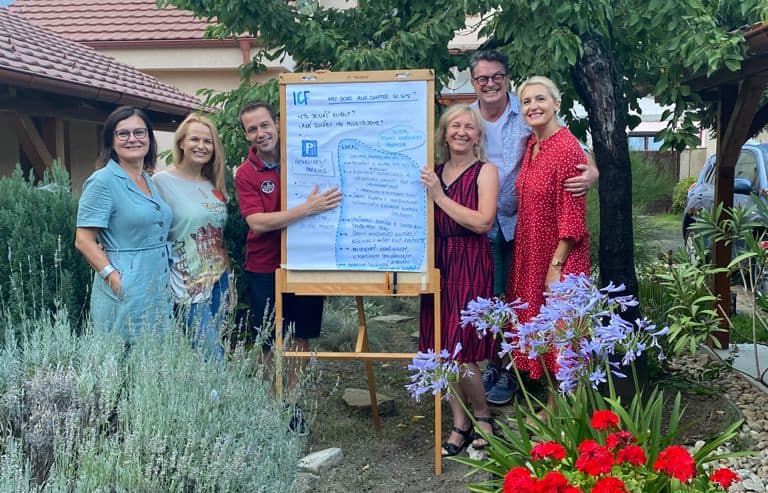The ICF Slovak Charter Chapter, which began in 2007 with seven members, has grown to nearly 100 members in 2021. In the early years, they focused on basic services and creating awareness of: professional coaching; ICF core competencies & ethics; and ICF credentials. Now the group is reaching out to other countries, chapters, and organizations, seeking opportunities to build a rich and sustainable pro bono coaching program.
Since the early years, they have adjusted their programs as their community of coaches in Slovakia grew, and tied their programs to their key aims. Among the important Chapter aims are the intention to contribute to positive changes in society through coaching, and to share coaching culture.
The group began their first project in 2017. “We wanted to support someone who we thought really needed our support and who could appreciate it,” explained Boris Dobis, 2016 President. They extended a pro bono coaching offer to a branch of the Roma Education Fund.
Tomas Pesek, who joined their Board in 2018, recalled the next step. “We started to talk about potential activities, where our work might be helpful to something that would have a positive result on society.”
From those first pro bono experiences, the Slovak Charter Chapter began what they now call their:
“Learning Points”
– The pro bono project needs to be a true partnership. “The most important learning experience was that there should be mutual needs. It’s not only the ICF will or the will of coaches, but it should also be the will of people who are able to say, ‘Yes, we need, and we appreciate coaching’,” Boris said. They began partnerships that were satisfying for both parties.
– Pro-Bono projects are not to be training fields for beginning coaches.
– Coaches should be carefully matched to Coachees. They use Ignite guidelines to help make matching decisions.
Evaluating the impact of the pro bono project is a multi-layer process:
1. Projects are always brought before their Board before making any agreement with an organization.
2. Ignite Guidelines are used from the first moment:
• Making agreement with an organization
• For expectation management between Coach and Coachee, and
• For evaluation (pre-evaluation and post-evaluation)
3. Debriefing/Talks are conducted with Coaches about progress.
4. Sustainability of the project is key. Do partners continue (often with noncommercial prices) with coaching work after the project is completed? “If so, it was obviously of value to them,” said Tomas.
Other Previous Pro Bono Projects by the Slovak Charter Chapter Include:
Lemon Coaching—This program answers the question, how can we be useful as a community in society? Lemon Coaching platform was launched by the group around Anita Kardum in March 2020 once it was adapted to ICF standards. “We co-created a coaching pool for people in crises about the pandemic,” said Boris.
Teach for Slovakia— This program’s mission is to create a community of leaders who work together on change in schools so that all children have a chance to succeed in life. It has been operating in Slovakia since 2014 and currently has 21 partner primary schools in 5 regions where its participants operate.
Duke of Edinburgh International Award in Slovakia –This is their most recent project, and it ended in autumn 2021. They bring together practical experiences and skills to create committed global citizens and equipping young people for life. They have over 5.000 participants in program, over 200 schools and organizations and over 800 volunteers.
This forward-looking Chapter is achieving their aims, contributing to society, and sharing the coaching culture as evidenced by the positive comments of participants:
“I was very satisfied. I especially liked the open, friendly approach and of course the
professional attitude of the Coaches.”
“The Coach is flexible, empathetic, polite and experienced.”
Participants have “talked about how important it was to have someone to talk to and guide them. They have been very positive,” said Tomas. “That has encouraged us to look for more projects.”
For the future, ICF Slovak Charter Chapter is seeking “umbrella projects where we could participate,” Boris explained. “Even though we are a tiny country, we could establish a point of contact and become useful” in an international project.
 Boris Dobis: Boris, originally coming from corporate sales where he was active in various positions, has been an ICF member for almost 10 years. Intensively engaged with coaching since 2008, he has been serving at ICF Slovak Charter Chapter (2016-17 as Chapter President, Board Member now). On the global level, since 2021, he has been contributing as Board of Directors Member at ICF FO Credentials & Standards.
Boris Dobis: Boris, originally coming from corporate sales where he was active in various positions, has been an ICF member for almost 10 years. Intensively engaged with coaching since 2008, he has been serving at ICF Slovak Charter Chapter (2016-17 as Chapter President, Board Member now). On the global level, since 2021, he has been contributing as Board of Directors Member at ICF FO Credentials & Standards.
 Tomas Pesek: Tomáš is an ICF Young Leader Award honoree in 2021, fresh PCC and active in ICF Slovak Charter Chapter board since 2018. He is from the non-profit sector and his field of expertise is learning and education and he works mostly with youth workers, teachers and youngsters. Likes innovative ways how to support young generation in their growth and through training of coaching competencies brings coaching approach to the education field.
Tomas Pesek: Tomáš is an ICF Young Leader Award honoree in 2021, fresh PCC and active in ICF Slovak Charter Chapter board since 2018. He is from the non-profit sector and his field of expertise is learning and education and he works mostly with youth workers, teachers and youngsters. Likes innovative ways how to support young generation in their growth and through training of coaching competencies brings coaching approach to the education field.
Subscribe to our newsletter!

